05.07.2017
For those who have not the time to see Peter Toepfer’s speech on youtube, here’s a summary of it by Keith Preston and Peter Toepfer
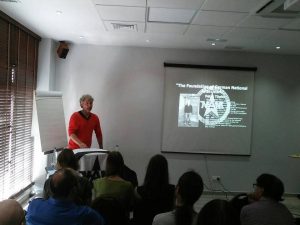
The second speaker was Peter Topfer, whose life story I found to be quite fascinating. Peter explained the way he found National-Anarchism and what it means to him. He was born and raised in East Germany, and described how he became a Maoist in his teens much to the disdain of his parents, coaches, and authority figures in the DDR. In the mid-1980s he became interested in the political right, but found the right-wing to be too rigid, and not particularly satisfying or interesting. At one point he was involved in a collaborative effort with the Anarchist Pogo Party of Germany during the 1980s. On another occasion, he was involved in the development of the QUERFRONT (“cross front”) left/right collaboration in Germany as well. During a time of personal crisis he was faced with the questions of who am I, what do I want, and how do I want to live? In 1995, he heard of Hans Cany who promoted the idea of National-Anarchism in France. Peter found this to be a very interesting concept as he had previously encountered the ideas of the National-Marxist Reinhold Oberlercher, without actually becoming a National-Marxist or a National-Anarchist.
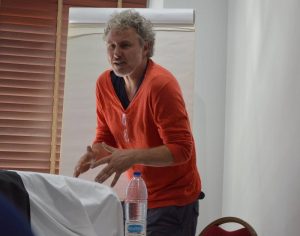
Thinking that his rightward tendencies had made him “too hard” on a personal level, Peter began making his way back than to the left in the sense of embracing more softness and flexibility. This led him to finally create his own conception of National-Anarchism, which Peter considered to be a very libertarian and emancipatory position, and related to the pursuit of personal truth, together with an affirmation of nation, ethnicity, community, culture and tradition. He considers this personal evolutionary process to be a natural and personal way of embracing National-Anarchism, or more precisely Neo-National-Anarchism, because in the 1920s there had already been National-Anarchists such as Helmut Franke. Peter subsequently contacted Hans Cany in France, and not just as somebody interested in National-Anarchism but as a National-Anarchist comrade. It was at this point that he learned from Hans that someone else had initiated a very comparable tendency at the same time, and established a new position that he called also National-Anarchism. That was Troy Southgate in England.
Peter’s version of National-Anarchism is closely related to self-emancipation. As long as we are not self-emancipated in the Stirnerian sense, he says, we are not really alive and have no real motivation to live. Our will to live, to survive and to assert ourselves is lost deep inside of us. He integrated not only the pro-national and pro-ethnic standpoints of the Right into his Weltanschauung, but also the most radical self-emancipatory theories and psychotherapeutic techniques developed from the theories and practices of Wilhelm Reich and Arthur Janov, both of whom originated from the radical Left.
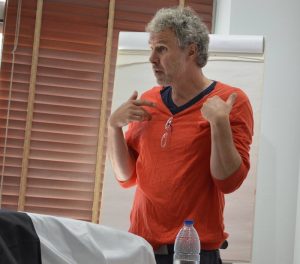
After discovering the limitations of Arthur Janov’s primal scream therapy while at Janov’s institute in Paris, Peter began to develop his own theory and practice that he called “Deep Truthing.” Peter describes himself as a “post-intellectual” who has no interest in theories and prefers to focus on life and survival, believing that theories are no good unless they have a practical application, but he says that the crucial point of human history and evolution is the Neolithic Revolution. Everything changed at that point. Ever since, we have had all of the gifts of civilization but also its problems: war, mass murder, violence, sickness, alienation, etc. And we are divided between affirmation and criticism of the post-Neolithic world. Peter says he is not an intellectual except for when seeking understanding he has to fall back on, resort to, or to recourse to something intellectual. He says this is important because National-Anarchism should be post-intellectual, at least in his own-understanding or in his version of National-Anarchism, in order to distinguish it from other philosophies. Intellectuality is the old world. Now, National-Anarchism proposes to go in new ways which are the indeed old ways from before the Neolithic revolution when there was no intellectualism.
Peter says that on the one hand we have the historic example of people who discovered wondrously how to survive in the desert (regions that were green and fertile until the desert appeared). They discovered that if they put seeds in the soil and watered them, there will be plants emerging some months later. While some primitive peoples remained sedentary, others handled the new situation of desertification in an extremely violent way. They hijacked and conquered the lands which had not become deserts. Peter points out that conquest of this kind can occur not only by means of violence as was the case with the Huns, the Mongols, and other marauding groups, but also by means of intelligence, deception, and manipulation. Just as people are able to learning how to breed animals and use them for their own purposes, so are they also able to use other human beings for their own purposes as well. For them, other human beings are just cattle.
Ideology can be a tool of manipulation of this kind. Peter noted that at the conference other participants and debaters denounced “totalitarian humanism” (as term popularized by yours truly as a synonym for the modern phenomena of “political correctness,” “social justice warriors,” the antifa, authoritarian progressives, and other parallel or overlapping trends) but Peter thinks this concept of totalitarian humanism is not radical enough. Instead, he argues that humanism is always totalitarian, and that there is no good humanism. The proponents of humanism ultimately engage in hypocrisy. An example is the Zionists, which preach humanism and universalism to others. Humanism insists that all that matters is the global citizen, while the Zionists practice ethno-nationalism and dismissing outsiders as goyim. Consequently, humanism used in this context merely becomes a weapon of Jewish ethnocentrism and supremacy. Peter points out that many people are fixated on Islam and criticize the Islamic culture as the “religion from the desert,” noting that even the even the Jewish Defense League makes alliances with Odinists against the Muslims nowadays. But he argues that while Islamism is a threat, it is far more acceptable to criticize Islam than to criticize Zionism and the Jewish ethnocentrism that it represents, and which exercises a much greater influence.
Humanism becomes imperialistic and seeks to dominate other peoples by destroying their group identity, and the means towards this end are humanism and universalism. This is done by means of corrupting the indigenous intelligentsia and making them herders of the defeated peoples.
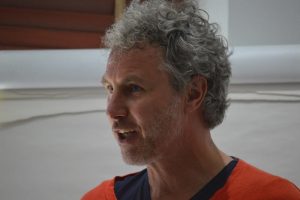
The ambition of humanism is to transform all kinds of human beings with vastly different culture into humans, regardless of language, customs, mentality, and other specificities into a polymorphous mass with only “culture“ which will not be a culture because it is not necessary for slaves to have a culture. The main ideological weapon of the humanists is to preach universalism while staying for themselves extremely particularist. We are all equal, they say, but they are more equal than others. They wage war by means of ideas that are placed in the heads of other peoples (with ideas assuming the same role as seeds), a way that is much more effective than other conquerors who were more violent but not as successful in the end.
These have been among the changes that the Neolithic Revolution has brought to the external, political world. But the Neolithic Revolution, Peter says, also brought with it a break in the human psyche, and a huge change of the inner world. In the same way and at the same time that people discovered they can breed animals and plants they also discovered their own reproductive capabilities. When a seed is placed into a woman’s womb, there will be a child in nine months. Until the Neolithic Revolution fatherhood, was not known and had no importance. The patristic structure was born and its first victim was the man who had to be the “father.”This became the main reason for the higher levels of stress experienced by males with their life expectancy being less than women.
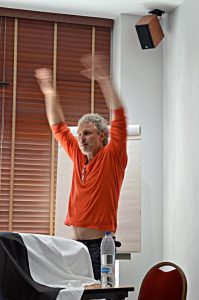
The consequence of civilization is that people began to breed not only cattle and plants but human beings. They began to consciously reproduce and sexuality developed a purpose. This purpose was the utilization of their offspring as labor and so from the beginning of their lives children were subjected to involuntary servitude. This became the first and deepest form of child abuse. Until the Neolithic Revolution, a child was just himself or herself. Now, children had to become slaves to their breeders. They were not themselves anymore, and this was the beginning of the alienation. Peter says one of the main goals of National-Anarchism as he defines it is to reverse this process of conquest, subjugation, and alienation. He observes that, “We should become ourselves again (the goal of Deep Truthing) and let our children develop themselves freely so they can stay themselves. They should not live for others and others’ purposes, just for themselves and their community.”
Keith Preston’s complete summary of all speeches at the National-Anarchist Movement Conference 2017
.
